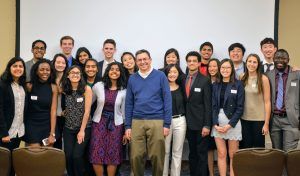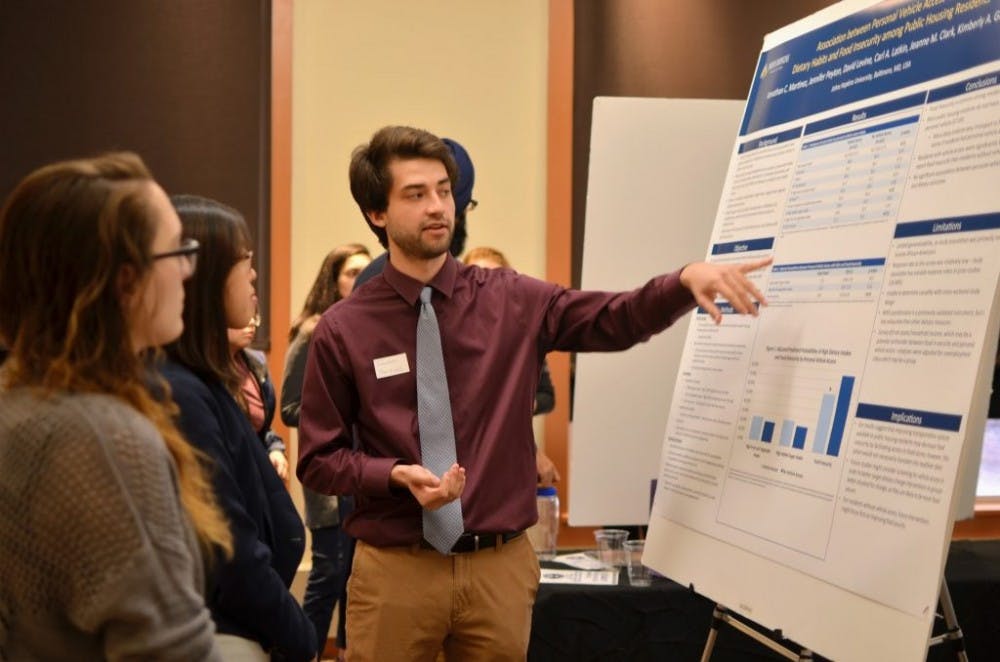Public Health Studies undergraduates pinned on their nametags, set up their poster boards and hosted the eighth annual Undergraduate Conference in Public Health on April 8. Flocking to the Charles Commons Salons, these students were ready to present their research in the field of public health.
This conference featured several students giving oral presentations and poster presentations, a roundtable discussion with public health professionals in Baltimore and a keynote speaker, Dr. Joshua Sharfstein. Sharfstein has extensive experience working in the field of public health and has worked as health commissioner of Baltimore City, secretary of the Maryland Department of Health and Mental Hygiene and deputy commissioner of the Food and Drug Administration.
“My favorite part of the event is a tie between the networking lunch, when I got to speak with an incredible environmental health official, and the keynote, because Dr. Sharfstein is such a wonderful and experienced member of the public health community,” sophomore Indu Radhakrishnan, a member of the Public Health Student Forum, the host organization for the conference, said.
The event opened with seven undergraduates presenting their recent findings in places ranging from locally in Baltimore to miles away in India. One student, junior Shivani Mehta, recently conducted research in Pune, India, analyzing the diets of HIV positive pregnant women and how differing diets affected their immune systems. Unfortunately, Shivani was only able to be a part of the ongoing study for a short amount of time, but she plans to continue the research in the future.
She said that she hopes the study will produce promising results. She notes that a group from Britain’s Medical Research Council has recently found that in Gambia, if you are born in September, you are approximately seven times more likely to die as a young adult than if you are born in June all due to maternal nutrition during pregnancy.
Another student, senior George Mwinnyaa, focused his project on HIV in Uganda.
“George Mwinnyaa had an amazing presentation about never married women in Uganda and the age of their sexual partners; I had no idea that older sexual partners can be an indicator of increased HIV risk, and it opened my eyes to just how many meaningful metrics exist to help combat disease.” Radhakrishnan said.
Senior Atsumi Kimura. Kimura also confronted the issue of HIV/AIDS, focusing her research about how social media impacts HIV/AIDS treatment.
Senior Joon Bae described how Kimura’s research had challenged her assumptions about social media.
“I’ve only thought of social media as something that hinders the process of prevention and treatment because people are more likely to show prejudice and present stigma especially when they’re anonymous, or so I thought,” Bae said.
“Her poster actually suggested that a number of infected informed others of their positive status using social media,” she said.
Senior Jonathan Martinez worked on a study called “Association between Personal Vehicle Access with Dietary Habits and Food Insecurity among Public Housing Residents.”
This study noted the disparity in cardiovascular disease and obesity among residents of lower income neighborhoods and public housing and attempted to help explain the reasons for this difference. Obesity and cardiovascular disease are also caused by lack of access to nutritious food, or food at all.
Martinez conducted an experiment to find out if having a personal vehicle allowed a person to escape the food desert, overcome food insecurity and ultimately make healthier decisions. They initially hypothesized that having a personal vehicle would decrease both food insecurity and intake of added sugars, fats and processed foods.

The study asked residents of two public housing blocks in Baltimore. Some had a personal vehicle, some did not. The participants were asked how many fruits and vegetables they had eaten in the past two weeks. They were also asked if they had difficulty accessing food. In other words, the study essentially asked people if they were food-secure.
What they found was surprising. The subjects consumed fruits and vegetables and added fats and sugars in about the same amount, regardless of access to a personal vehicle. But the researchers were correct in hypothesizing that those with personal vehicles were approximately 20 percent more food-secure.
Nevertheless, food insecurity is not at all an issue that can be written off, as over 50 percent of people with personal vehicles still felt food-insecure.
This suggests that health and nutrition are less affected by access to healthy food than they are by the costs of more nutritious foods.
Soon after the poster presentations, the lunch roundtable discussions began. One of the leaders of the roundtable discussion, Special Projects Director of the Baltimore City Health Department Kelleigh Eastman spoke about just how much the Health Department does in Baltimore and how many areas it governs in Baltimore.
“In the future, we hope to keep bringing compelling speakers to the conference and to make it more popular with the student body by advertising more widely and by expanding our connections with the Bloomberg School and the [Public Health] Department,” Radhakrishnan said.
Overall, with more attendees than previous years, organizers stated that the event was a big success.
“The point of the conference is to give students a forum to learn more about public health in a dynamic and exciting way, and I think we absolutely succeeded with that,” Radhakrishnan said.

















